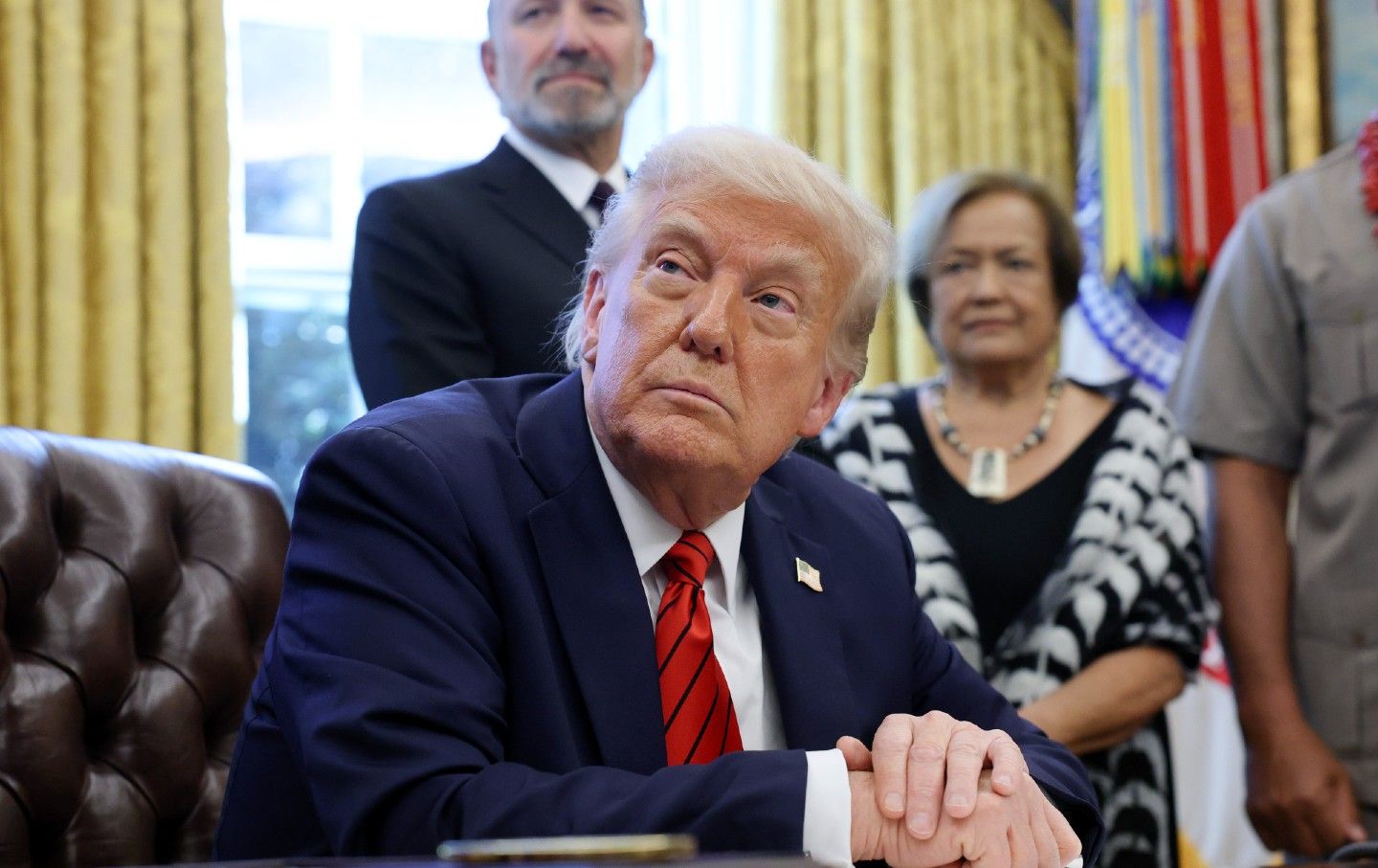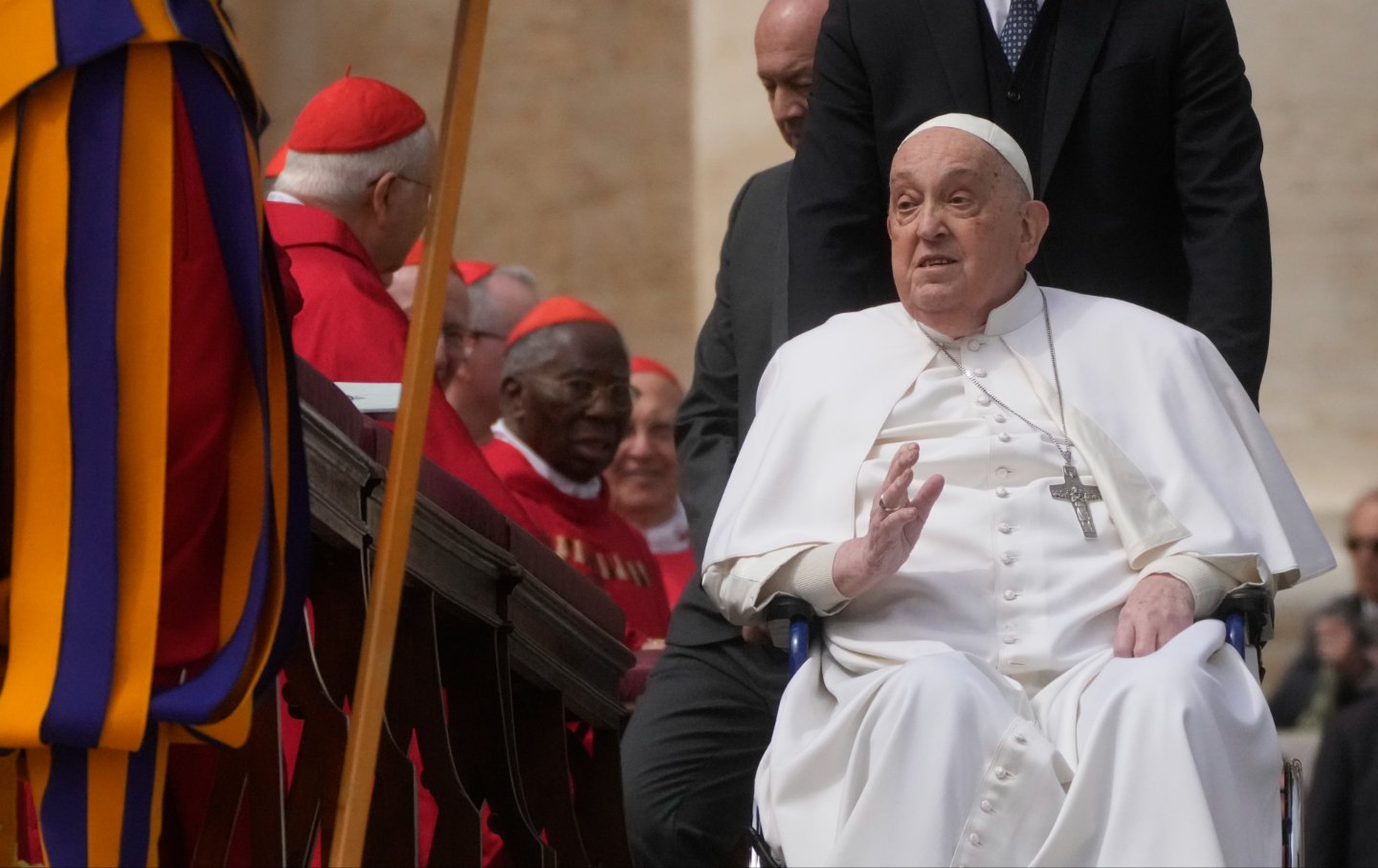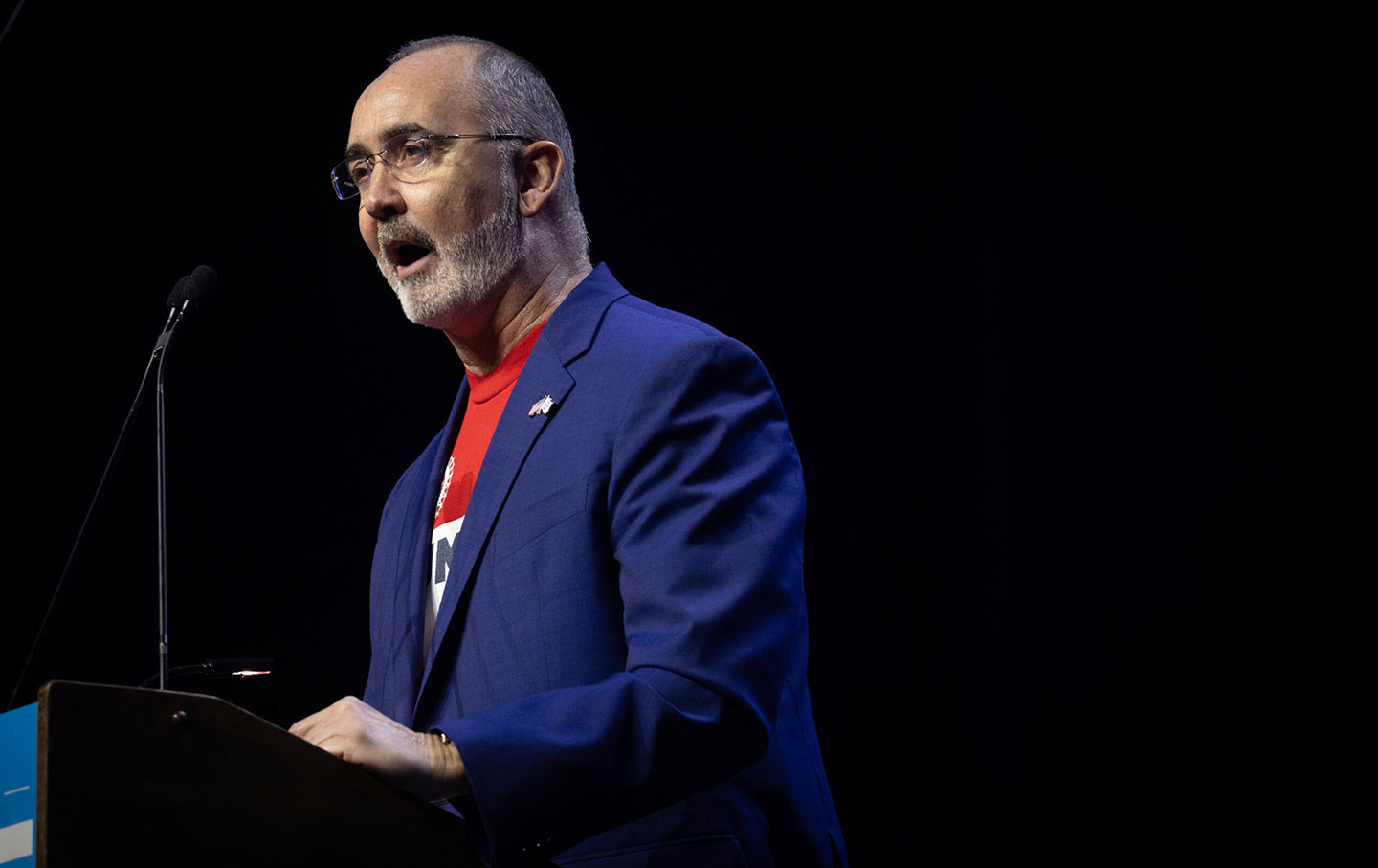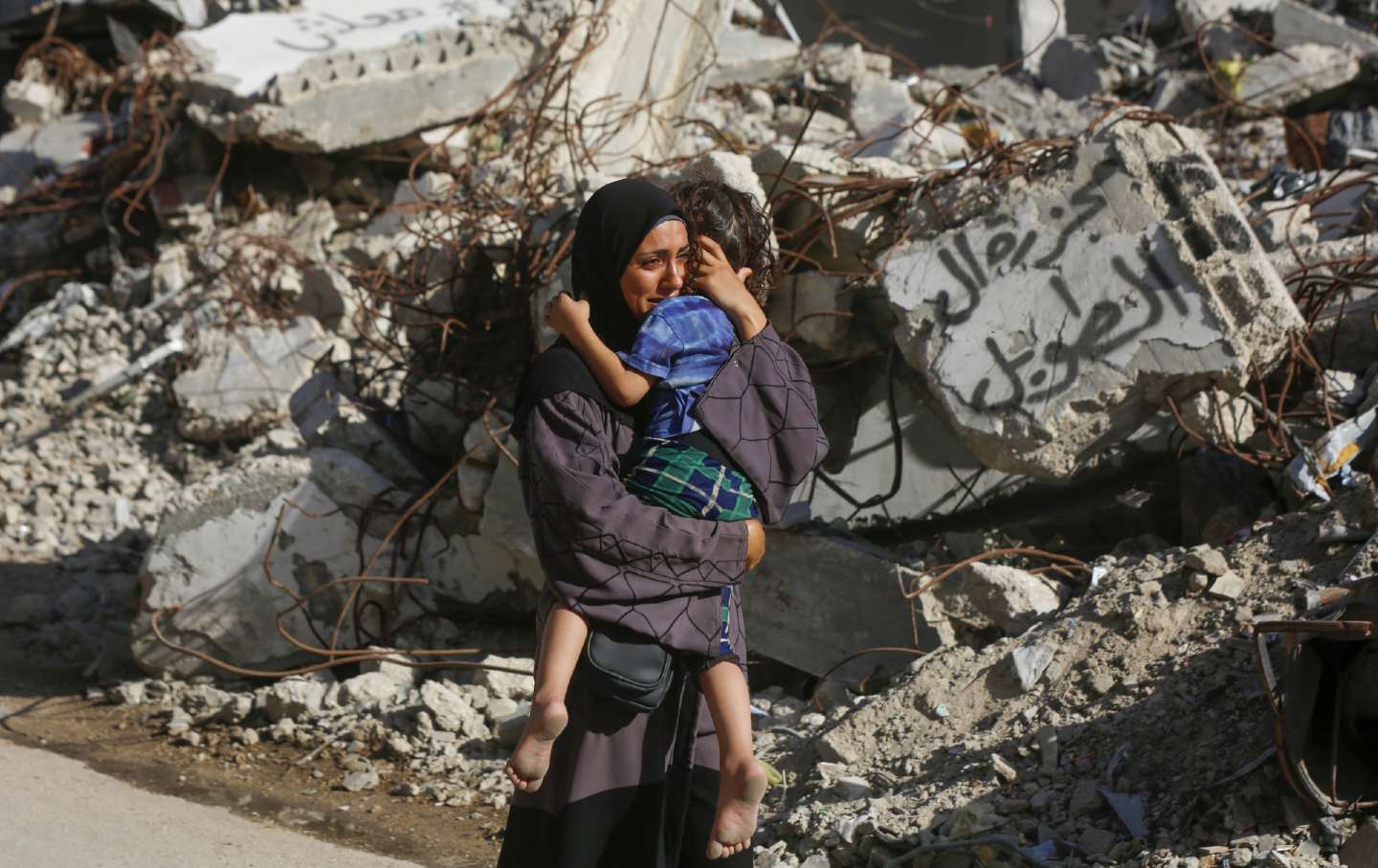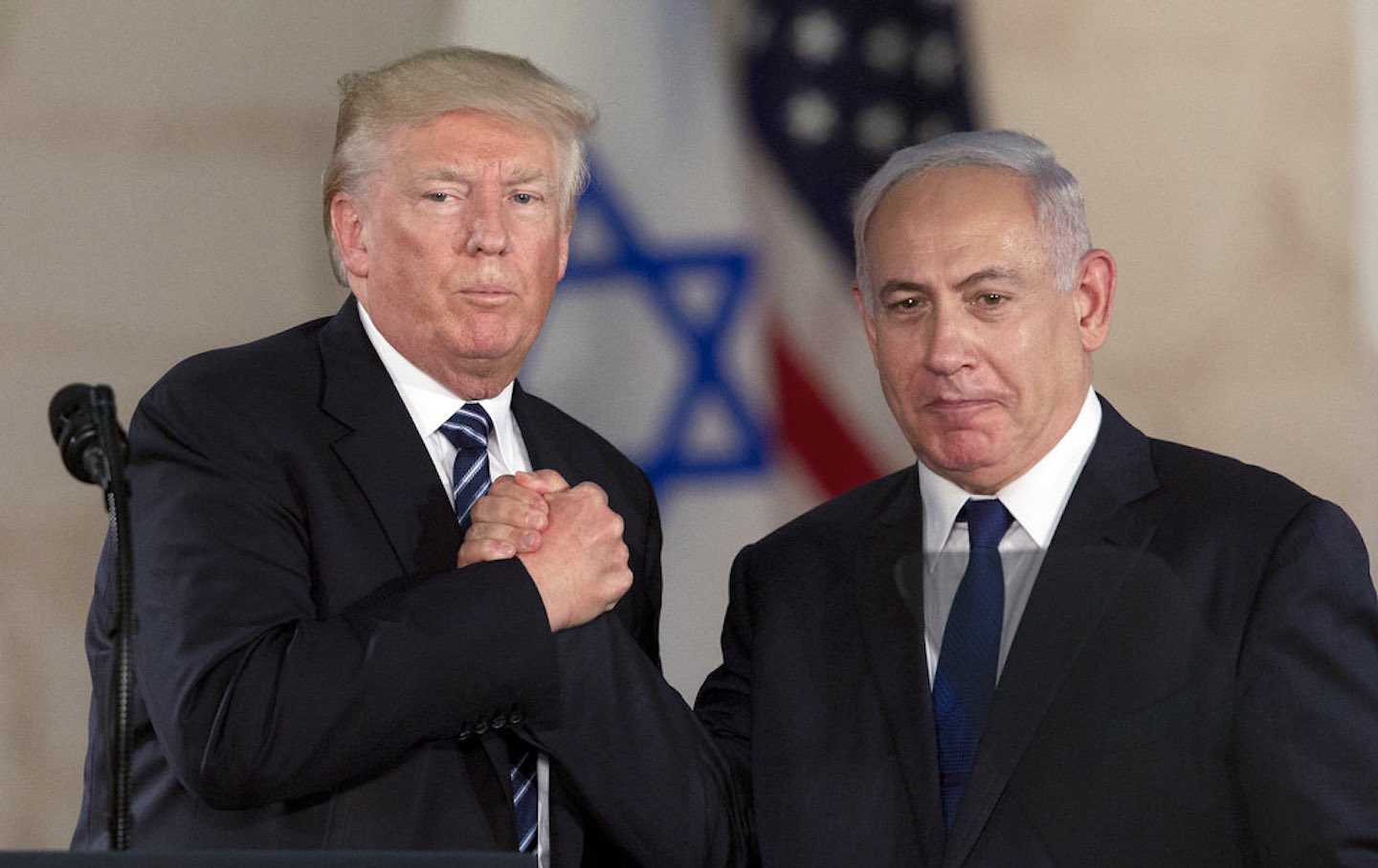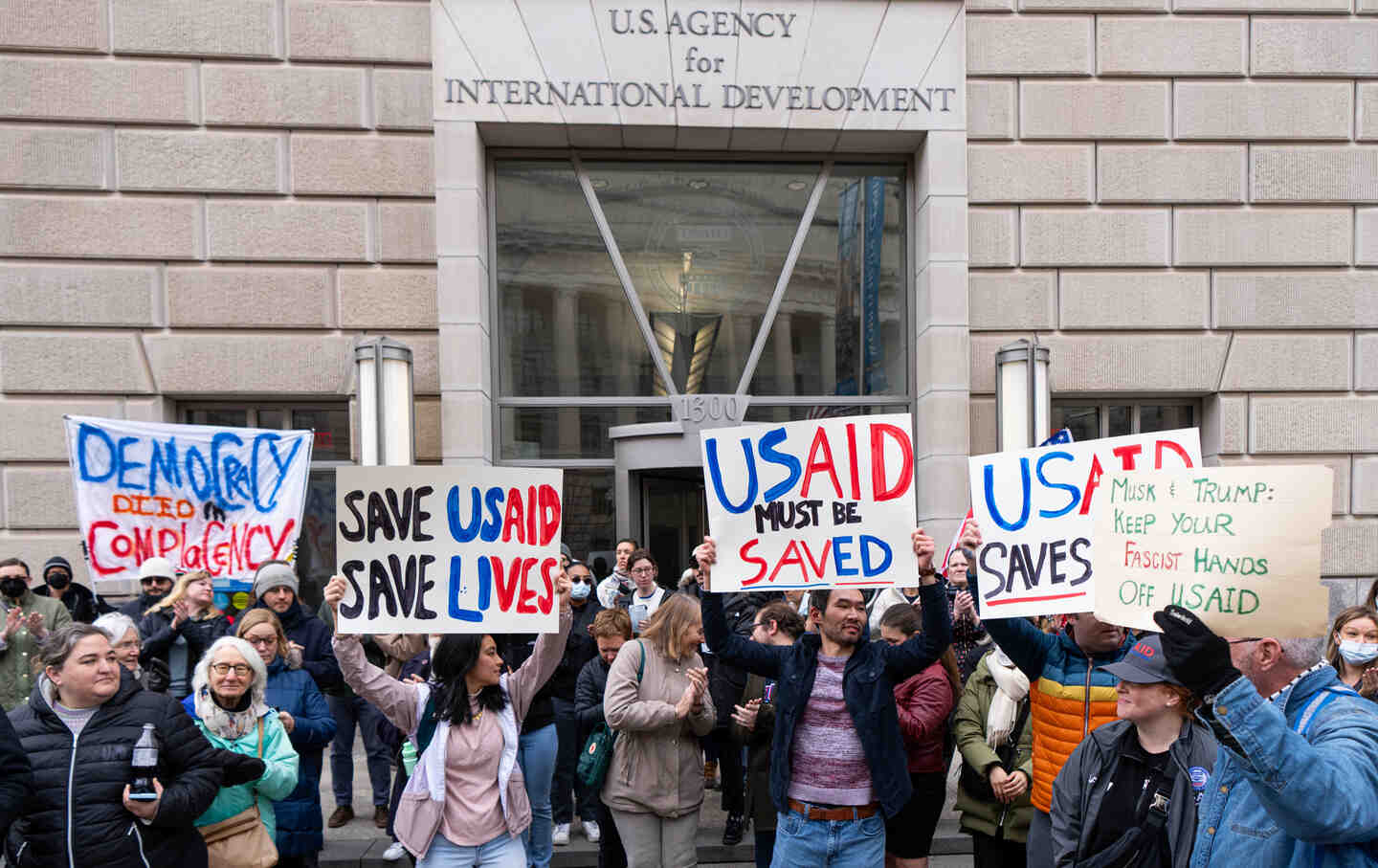College Administrations Are Failing Their Palestinian and Jewish Students
Campus activists say many university leaders have declined to protect Arab and Muslim students, and by conflating Israel and Judaism have only stoked antisemitism.
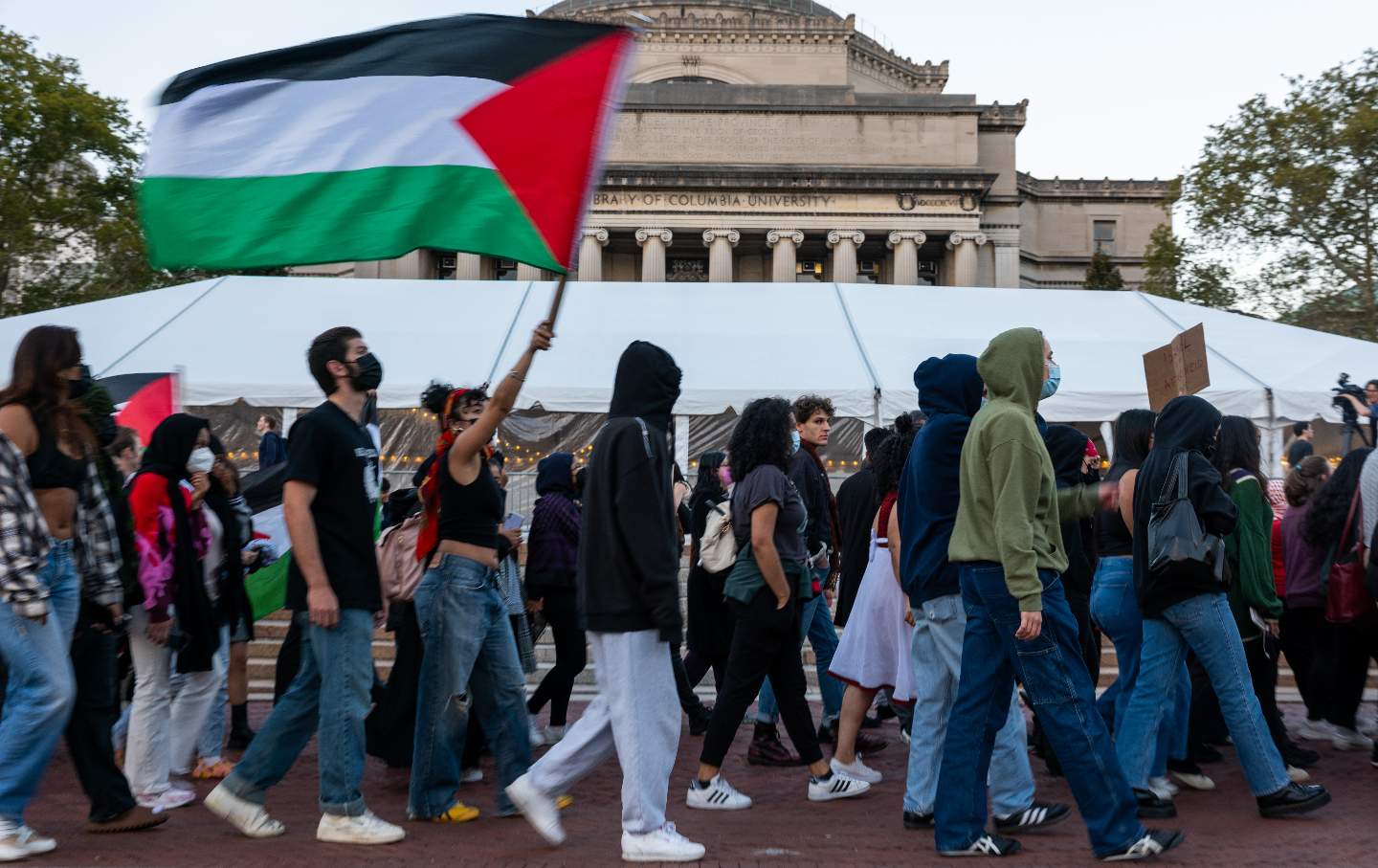
Columbia University students participate in a rally in support of Palestine at the university on October 12, 2023, in New York City.
(Spencer Platt / Getty)“I lost 14 family members in the church bombing in Gaza,” Layla told me.
Layla requested that only her first name be used, due to safety concerns. She is a Palestinian American student at Columbia University. Grieving with dignity there, she said, has felt impossible. She has been repeatedly called a terrorist while walking on campus wearing a keffiyeh—a traditional Palestinian scarf, which has become a symbol of resistance. One student, she recalled, asked her if she was a Hamas supporter. She took the time to explain, no she isn’t, that she’s Christian, that her family is Palestinian. He interjected, “You must support raping women. You must support beheading babies.” Soft-spoken, she said she replied to him: “No, I never said that.”
“Doxing trucks,” organized and funded by the conservative media group Accuracy in Media, have been driving around campus. Each side of the truck is adorned with LED screens that display the names and faces of suspected pro-Palestine Columbia students under the caption “Antisemite.” While doxing isn’t in itself illegal, harassment and intimidation are. But neither the university administration nor law enforcement have done anything to protect those students, even though dozens of New York City police officers have been mobilized to supervise Palestine protests. Activists have been left to handle the doxing themselves, and stand in front of the trucks with balloons and posters to cover the names and faces.
“It’s a form of psychological warfare,” Layla said, “because what they’re trying to do is silence us.”
At another Ivy League 200 miles Northeast, a Palestinian American Harvard student has had her face and name posted on a doxing truck there, her first and last name turned into a website domain that calls her an antisemite, and numerous posts on X (formerly Twitter) proclaiming her a terrorist. As a result of this doxing campaign, an employer who had previously offered her a job called her into a Zoom meeting in order to rescind the offer. At the Zoom meeting, they read out a statement, insinuating that she supports Hamas and stating that those values didn’t align with their company’s values.
The Harvard student, who asked to remain anonymous out of safety concerns, has also lost family in Palestine. She told me: “The day I learned that my cousin was killed by the IDF on a raid of his refugee camp, was also the day that I found out that the truck with my name and face on it, calling me an antisemite, would be sent to my parents’ home.”
Clampdown
Columbia, Harvard, and other colleges are seeing large anti-war protests in response to Israel’s assault on Gaza, which has been widely recognized as violating international law, and—at the time of this writing—has killed over 13,000 Palestinians, including 5,000 children.
Many college administrations, meanwhile, have responded to protests with condemnations, suspensions, event cancellations, arrests, and more. “We’re in a moment where dissent is of a world historical importance,” Dylan Saba, an attorney with Palestine Legal, said, “and you have organized institutional efforts to stamp that out.” Palestine Legal has seen an upsurge of incidents of suppression on campuses since October 7. It has received over 700 legal requests, more than twice the number received in all of 2022.
At Columbia, the administration suspended the student groups Students for Justice in Palestine and Jewish Voice for Peace, accusing the groups of violating university event policies, and engaging in “threatening rhetoric and intimidation.” Those policies, requiring 10 days advance notice for permitted actions, were later found to have been quietly and unilaterally changed by the administration in the lead-up to SJP and JVP’s suspensions. The groups were suspended after a walkout, art installation, and “die-in” on the campus plaza on November 8.
None of the footage or coverage of the action indicates any threatening speech or action. In fact, when the Columbia Daily Spectator, the campus newspaper, reported on the event, it noted an incident in which an unidentified individual “began screaming antisemitic and anti-Black statements, [and] attempted to instigate fights with numerous students.” The protesters booed and confronted the individual, forcing him out of the protest, while the speaker on the megaphone denounced antisemitism.
Nevertheless, the pretext for the suppression of Palestine activism has been a broad accusation of antisemitism and a professed concern for Jewish safety on campus. Saba explained, “Israel advocacy organizations for a long time now have been pushing a false narrative that pro-Palestine expression is inherently antisemitic. Telling Palestinian students that talking about their families and what’s happening to them and how they feel about it, and the politics that flow from that—saying that is unwelcome speech on university campus is dehumanizing. And it’s a blatant act of suppression of dissent.”
Incidences of antisemitism have been on the rise across the country, including on college campuses. Many student activists that I spoke to expressed their concerns and commitment to addressing any instances that leave Jews feeling vulnerable. Nevertheless, they also noted that college administrations have been virtually silent on the topic of Arab and Muslim safety.
At Harvard University, a statement initiated by the Palestine Solidarity Committee (PSC) and signed by another 33 student organizations held the Israeli government responsible for the violence in Israel and Palestine. It provoked a fierce backlash, with students identified with the statement harassed and doxed.
Students compiled a list of more than 70 incidents of harassment, threats, and doxing, which they turned over to the administration. Victims included a female student in a hijab who was chased with a knife, another woman whose hijab was ripped off, a counterprotester driving his car threateningly at a protester as he left a rally. Four law students have lost their jobs; three are being investigated; and more have had jobs rescinded. According to a Harvard Law student, who asked not to share her name, two people who had their job offers taken away were copresidents of an organization that had signed on to the PSC statement. They received an e-mail from a student that asked whether they were responsible for signing onto the letter. “You have 24 hours to confirm or deny,” the student threatened. They didn’t respond to his e-mail. He deemed their silence as confirmation, and they were doxed. Both lost their jobs.
The Harvard administration did not respond to these and ongoing student complaints of harassment, and has offered no support to those that lost their jobs because of signing the statement. Instead, on November 9, Harvard President Claudine Gay sent an e-mail to the university community titled “combatting Antisemitism.” The 1,200-word e-mail mentioned Islamophobia once. And while insisting that “combating antisemitism and fostering free expression are mutually consistent goals,” the letter goes on to say that “phrases such as ‘from the river to the sea’ bear specific historical meanings” and should therefore be condemned.
In the aftermath of Gay’s letter, Palestinian students asked her to meet with them. To date, Gay has not reached out to Palestinian students, nor used the word “Palestine” in any communication. “It was shocking,” the Harvard Law student told me. “To see no reference to what Brown people, or anyone advocating for Palestine is facing on campus, it’s jarring. You start to wonder, do they even hear you when you talk to them?”
Popular
“swipe left below to view more authors”Swipe →When Gay finally met with a group of Muslim students (among whom a small minority was Palestinian), the students shared their stories of loss and pain. Gay’s only response was to reiterate that she has not abandoned her commitment to free speech, but that she has her own right to free speech and to make any statements that she deems fit.
The Tide Begins to Turn
But in some ways, the law student identified Gay’s e-mail as part of a turning point on campus. When Gay’s e-mail came out, “people that aren’t necessarily even political were appalled. Like we are living in an alternate reality that this was the kind of e-mail that she’s going to send out.” Days later, administrators threatened a group of law students with disciplinary actions for phone banking in a public university space. The action garnered social media attention and fed the growing feeling that the administration was out of sync.
At Columbia, within a few days of SJP and JVP’s suspensions, over 40 student organizations responded by forming a coalition called Columbia University Apartheid Divest (CUAD). A week later, the number of organizations climbed to 80. Several protests the following week drew an estimated 2,000 people. At one protest outside the campus’s gates, students and supporters chanted, “The more you try to silence us, the louder we will be!” and “Columbia, Columbia, you will see. We are all SJP!” The week of protests ended with a letter from 20 New York elected officials calling on the university to reinstate the organizations.
“I feel like the more they repress us,” said SJP member Maryam Alwan, “the more everyone else mobilizes and feels empowered to speak out.… When the university cancels every single event that even mentions the word Palestine, when external groups brought doxing trucks to campus, or when the administration brings the entire New York City police for to campus, making all the students of color feel unsafe, they show all the students that all of our struggles and all of our oppression are interlinked.”
A board member of Columbia’s Black Student Organization, who asked to be identified by his initials, N.J., told me that the group debated whether to participate in the CUAD coalition. Although the organization has always supported Palestinian rights, members of the board were afraid of being doxed. “Ultimately,” he explained, “we decided that people are dying, and it’s a privilege to be worried about future jobs.”
Yet even while future jobs may not be the primary concern, N.J. and others remain fearful for their physical safety. Many students show up to protests with their faces completely covered by keffiyehs. As Alwan explained to me, she weighed her own decision to show her name and face publicly for a long time. “I didn’t want to continue hiding from something that I’m not ashamed of, for calling for human rights, and for being a Palestinian and existing. At the same time, there are strong safety concerns that have made me feel terrified this entire time.”
In part horrified by Israel’s escalations, in part dismayed by the actions of their own administrations, more students across the country have been galvanized to respond.
Thus at Brandeis, the campus had been relatively quiet, but on November 6, the school’s administration became the first to suspend its SJP. (The second was Columbia, followed a few days later by George Washington University.) Later that week, police violently dispersed and arrested nonviolent student protesters. One Brandeis student, who requested anonymity out of safety concerns, told me that she witnessed police tackling and chasing after student protesters, “slamming them to the ground.” She’s scared, she told me, and organizing around Palestine for the first time. But everything she has seen play out in Gaza and on campus this past month has propelled her to “stand in solidarity with the Palestinian people.”
Meanwhile on November 14, at Hunter College, part of the City University of New York system, the administration canceled a screening of Israelism, a film about two American Jews whose unconditional support of Israel was shaken by a visit to the occupied West Bank. The screening was planned back in June, as part of an ongoing series organized by Tami Gold, a filmmaker and professor at the university. In her more than 30 years at Hunter College, Gold told me, “never have I been censored.”
But the university administration received over 17,000 e-mails opposing the screening, part of an organized campaign that seemed to spit out identical, robotic-sounding text. One message from a WhatsApp group in Greenwich, Conn., was shared with me. It asked its members to click on “super easy links” to generate pre-written e-mails to schools. “We are happy to report,” the message reads, “that over the last 2 days we generated over 5,000 emails to the Dean of Hunter College, and Hunter College subsequently canceled their showing of Israelism.”
The cancellation had a “chilling effect,” Gold said. Some students and faculty, he said, were afraid to sign a petition in favor of getting the movie screened. But it also touched off a wider response. Students, who have been mobilizing sit-ins and protests at Hunter, packed a university senate meeting the next day. The senate—made up of students, faculty, and staff—passed a resolution condemning the cancellation and demanding that the film be screened later in the month. A week later, on November 21, the university president agreed to have the film screened within two weeks. “This is a victory over censorship,” Gold told me. “It shows the power of what faculty, students and our union did when the president acted unilaterally.”
More on the Israel-Gaza War
Jewish Safety
When I met with Rafi Ash and Lily Gardner, two Jewish Brown University students, I asked them point-blank: “Do you feel safe as a Jew on campus?” Without a pause Gardner replied: “Extremely.” And Ash: “Completely.”
Ash and Gardner are members of the newly formed Jews for Ceasefire Now, and were arrested during a 20-person sit-in on November 8. Though both relayed that they have experienced some forms of antisemitism throughout their lives, they are “really sure,” Ash said, “that it has never come from our allies and comrades.” In fact, Brown SJP “hosts the most lovely shabbats.”
Antisemitism is real, and it’s spiking. But it’s hard to tell exactly where and how much it’s increasing, because organizations like the Anti-Defamation League, which tracks its rise, also equates broad criticisms of Israel with antisemitism. Jewish organizations calling for cease-fire therefore have been among those labeled as antisemitic “hate groups.”
Several Jewish students I spoke with felt deeply uncomfortable with the conflation, not only because it unfairly targets pro-Palestine activism but also because it seems to stoke antisemitism. Antisemitism task forces at campuses give Jews a preferential treatment by prioritizing antisemitism over other oppressions, which has the effect of pitting groups against each other. They also often equate Judaism with the state of Israel, which can paint Jews as a monolithic group who support the unrelenting bombing, trapping, starving of another people. It “only makes real antisemitism harder to fight,” as one Jewish student explained.
Inspired by students at Brown and several other campuses doing the same, Jewish students at MIT organized themselves into Jews for Ceasefire (J4C). Gabriella Martini, one of the founders of the group, told me that she grew up learning about the Holocaust, and about the decimation of her great grandmother’s family in Poland. Her great grandmother, she told me, “came as an immigrant through Ellis Island alone, as a child, like many Jews did.” And although she thinks it’s important to organize in groups that are not only Jewish, in this case it felt important to be visible as a Jew for whom the MIT Israel Alliance does not speak. In fact, she explained: “I never feel more Jewish than when I’m fighting for Palestinian rights. Something that’s always been tied to my Jewish identity is a hope that what comes out of everything that’s happened to Jewish people is safety and peace for everybody.”
The group’s founding was in large part instigated by witnessing a peaceful sit-in on November 9, in which members of MIT’s Coalition Against Apartheid were assaulted by counterprotesters. One J4C member, who requested anonymity, came to the protest wearing his religious tallit and kippah. “The counterprotesters,” he told me, “quickly became violent,” making sexist and Islamophobic remarks, and taking pictures of women protesters. “I intervened by blocking the camera view with my tallit…and the counterprotesters got really mad at me, throwing awful verbal insults, saying things like, ‘God made a mistake by having me born a Jew.’” He emphasized: “The only anti-Jewish remarks I experienced that day came from those counterprotesters.”
Another member of MIT’s J4C is an Israeli American student who told me that she grew up a very nationalist Israeli. “I had very, very strong feelings about the flag. Every time I saw it, I felt like there’s a land that is for us.… I felt that I would die for this country, I loved it so much.” Having come to the United States and increasingly aware of the painful conflicts going on back home, she began to bury that part of her identity. “But,” she said, “this is not something that you can outrun. Now it’s not something that I can squash any longer. It shouldn’t have for years now. But now the situation absolutely necessitates a strong response from Jews—to end the genocide.”
Hold the powerful to account by supporting The Nation
The chaos and cruelty of the Trump administration reaches new lows each week.
Trump’s catastrophic “Liberation Day” has wreaked havoc on the world economy and set up yet another constitutional crisis at home. Plainclothes officers continue to abduct university students off the streets. So-called “enemy aliens” are flown abroad to a mega prison against the orders of the courts. And Signalgate promises to be the first of many incompetence scandals that expose the brutal violence at the core of the American empire.
At a time when elite universities, powerful law firms, and influential media outlets are capitulating to Trump’s intimidation, The Nation is more determined than ever before to hold the powerful to account.
In just the last month, we’ve published reporting on how Trump outsources his mass deportation agenda to other countries, exposed the administration’s appeal to obscure laws to carry out its repressive agenda, and amplified the voices of brave student activists targeted by universities.
We also continue to tell the stories of those who fight back against Trump and Musk, whether on the streets in growing protest movements, in town halls across the country, or in critical state elections—like Wisconsin’s recent state Supreme Court race—that provide a model for resisting Trumpism and prove that Musk can’t buy our democracy.
This is the journalism that matters in 2025. But we can’t do this without you. As a reader-supported publication, we rely on the support of generous donors. Please, help make our essential independent journalism possible with a donation today.
In solidarity,
The Editors
The Nation

